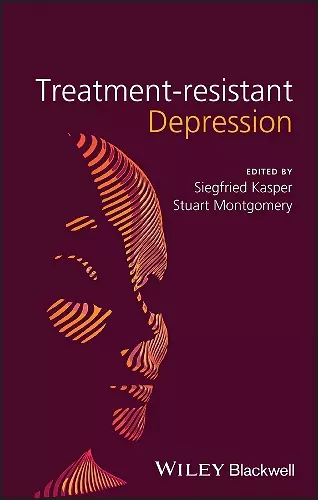Treatment-Resistant Depression
Siegfried Kasper editor Stuart A Montgomery editor
Format:Paperback
Publisher:John Wiley and Sons Ltd
Published:22nd Mar '13
Currently unavailable, and unfortunately no date known when it will be back

Treatment-resistant Depress
Successful management of patients with treatment-resistant depression requires a thorough understanding of the biological basis for both the depression and its failure to respond to standard treatments. This book clearly and succinctly summarizes the latest scientific research and its applications in clinical practice.
A first step is a clear definition of what constitutes treatment-resistant depression so that clinical trials and other studies are using common criteria, enabling comparison and meta-analysis of their outcomes. The opening chapter reviews definitions and predictors of treatment-resistant depression originating from different fields and discusses their usefulness in clinical practice and clinical research. The next chapter proposes a new definition, adapting terminology from medicine.
Biological classification requires identification of genetic risk factors and gene variants have been identified as accounting for 50% of the variance in the clinical outcomes of antidepressant treatments. Chapter 3 describes several genes already associated with treatment-resistant depression and, while further work is needed to translate findings into clinical recommendations, suggests that genetic prediction of treatment resistance could become a widespread clinical reality within a few years.
Most patients with treatment-resistant depression will be treated pharmacologically, so three chapters review the latest evidence for pharmacological best practice in switching strategies for antidepressants, the role of antipsychotics and augmentation strategies to complement lithium.
There are two major alternatives to pharmacotherapy: neuromodulation and psychotherapy. The brain intervention chapter summarizes clinical research and experience with electroconvulsive therapy, transcranial magnetic stimulation, vagus nerve stimulation, deep brain stimulation and magnetic seizure therapy. The final chapter reviews the literature pertaining to the effectiveness of various forms of psychotherapy in patients who have not responded to antidepressant pharmacotherapy, explaining that patients who have not responded to one or two trials of antidepressant medication have a 30%-50% chance of responding to a focused psychotherapy. It proposes indications for psychotherapy in treatment-resistant depression and summarizes general therapeutic principles.
Essential reading for all psychiatrists managing patients with this distressing disorder.
“After all, this book is recommended for the young psychiatrist, who wants to read an easy introduction to the fascinating world of treatment of resistant depression.” (Acta Psychiatrica Scandinavica, 9 November 2013)
“This is a monograph, which could be of great interest to psychiatrists managing patients with TRD. The chapters are written clearly, and the references are comprehensive and up-to-date.” (Human Psychopharmacology: Clinical & Experimental, 6 November 2013)
“The editors should be congratulated for accomplishing the amazing feat of presenting so much information in such a compact book. With an investment of just a few hours, readers can be updated on a very complicated subject . . . The editors should be commended on detailing a variety of treatment options, including nonpharmacological options, which other books fail to emphasize.” (Doody’s, 23 August 2013)
ISBN: 9781119952909
Dimensions: 199mm x 130mm x 13mm
Weight: 218g
228 pages